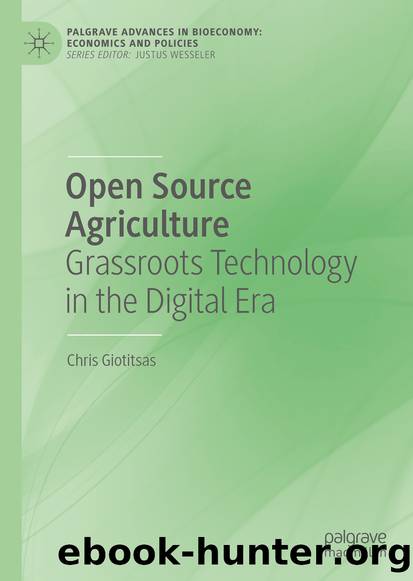Open Source Agriculture by Chris Giotitsas

Author:Chris Giotitsas
Language: eng
Format: epub
ISBN: 9783030293413
Publisher: Springer International Publishing
5.2.1 Technological Determinism
The study of technology has been dominated by determinism (Dafoe 2015). Technological determinism is built on the belief that technology is independent of societal influence and its progress is fixed. Instead, societies adapt to technological progress to facilitate the requirements of each new piece of technology. In this sense, the development of new technology does not take place within society and thus does not consider societal factors. This stance has excluded technology from humanistic studies since its explanation lies in technical rationality and scientific discovery rather than a social interpretation.
While the definition above describes the simplified version of technological determinism, there is still debate as to what truly constitutes determinism. It is also referred to as âhardâ by scholars. In another form of determinism, identified as âsoftâ or âmildâ, technology is perceived as a driving force for social change but influenced by social, economic, political and cultural factors (Smith and Marx 1994). Twentieth century technology philosophers like Jacques Ellul, Lewis Mumford and Martin Heidegger are viewed by many as soft determinists and pessimistic against technology which they deemed was out of human control. This can possibly be attributed to the fact that since the beginning of the century heavy industrialisation caused severe social and environmental degradation, while technology has been widely used for warfare (Brey 2010).
Ellul (1964) posits that technology has become an autonomous system that advances itself through social structures and values that place efficiency and logic above everything else, to the detriment of spiritual and moral values. Lewis Mumford (1966) similarly speaks about the mega-machine that âassemblesâ human beings to do its bidding. Their views led them to ascertain that the solution to the problem of modern technology might be to be rid of technology altogether. While some (Fores 1981) treat these views as soft determinism, others believe them to be critiques on the socioeconomic system that creates this technology rather than the technology itself (Wyatt 2008).
Wyatt classifies determinism based on the perception of certain social groups and individuals. These are descriptive, methodological, normative and justificatory (Wyatt 2008). Descriptive is the form used by technology theorists as a form of identifying and avoiding it in their work. Methodological determinism is employed by other theorists to examine the role of technology within society by placing it in the centre of their investigation. Normative determinism argues that technology has become so big that it is no longer under societal control. Last, justificatory determinism is the one deployed by societal actors and can be found everywhere around us, from policy documents to corporate decision-making. It is the type of deterministic rhetoric associated with the common views regarding technology and employed to justify controversial decision-making under the pretext of unavoidable technological progress.
Technological determinism, in its justificatory variety, is the most problematic, and while it has been vilified by technology scholars as simplistic and devoid of political agency, it is widely shared among social actors, and hence merits attention. That is because it still informs the popular opinion and decision-making processes regarding technology (Wyatt 2008).
Download
This site does not store any files on its server. We only index and link to content provided by other sites. Please contact the content providers to delete copyright contents if any and email us, we'll remove relevant links or contents immediately.
International Integration of the Brazilian Economy by Elias C. Grivoyannis(111057)
The Radium Girls by Kate Moore(12026)
Turbulence by E. J. Noyes(8047)
Nudge - Improving Decisions about Health, Wealth, and Happiness by Thaler Sunstein(7706)
The Black Swan by Nassim Nicholas Taleb(7128)
Rich Dad Poor Dad by Robert T. Kiyosaki(6631)
Pioneering Portfolio Management by David F. Swensen(6300)
Man-made Catastrophes and Risk Information Concealment by Dmitry Chernov & Didier Sornette(6019)
Zero to One by Peter Thiel(5798)
Secrecy World by Jake Bernstein(4751)
Millionaire: The Philanderer, Gambler, and Duelist Who Invented Modern Finance by Janet Gleeson(4478)
The Age of Surveillance Capitalism by Shoshana Zuboff(4291)
Skin in the Game by Nassim Nicholas Taleb(4248)
The Money Culture by Michael Lewis(4206)
Bullshit Jobs by David Graeber(4190)
Skin in the Game: Hidden Asymmetries in Daily Life by Nassim Nicholas Taleb(4004)
The Dhandho Investor by Mohnish Pabrai(3764)
The Wisdom of Finance by Mihir Desai(3746)
Blockchain Basics by Daniel Drescher(3581)
